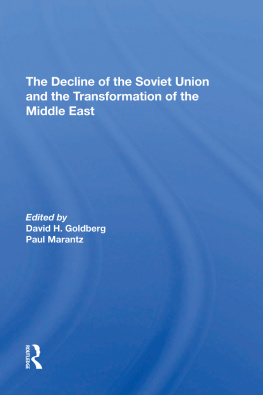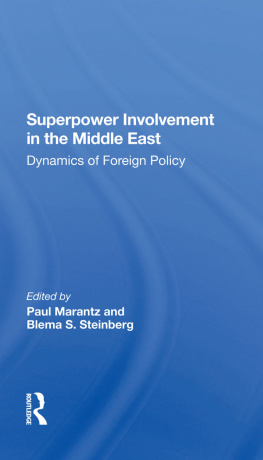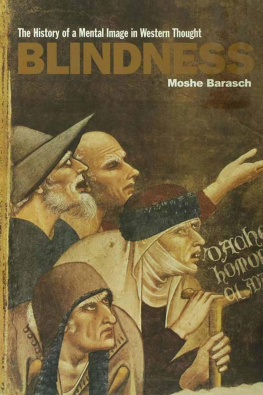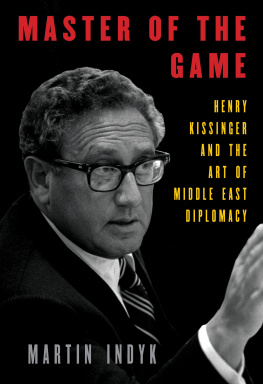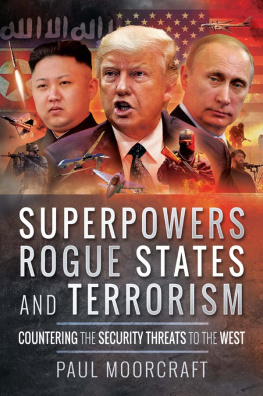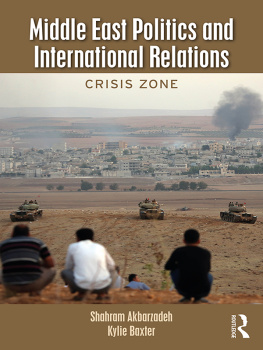
First published in 1991 by Routledge
This edition first published in 2017
by Routledge
2 Park Square, Milton Park, Abingdon, Oxon OX14 4RN
and by Routledge
52 Vanderbilt Avenue, New York, NY 10017
Routledge is an imprint of the Taylor & Francis Group, an informa business
1991 Moshe Efrat and Jacob Bercovitch
All rights reserved. No part of this book may be reprinted or reproduced or utilised in any form or by any electronic, mechanical, or other means, now known or hereafter invented, including photocopying and recording, or in any information storage or retrieval system, without permission in writing from the publishers.
Trademark notice: Product or corporate names may be trademarks or registered trademarks, and are used only for identification and explanation without intent to infringe.
British Library Cataloguing in Publication Data
A catalogue record for this book is available from the British Library
ISBN: 978-1-138-19428-1 (Set)
ISBN: 978-1-315-54183-9 (Set) (ebk)
ISBN: 978-1-138-65126-5 (Volume 12) (hbk)
Publishers Note
The publisher has gone to great lengths to ensure the quality of this reprint but points out that some imperfections in the original copies may be apparent.
Disclaimer
The publisher has made every effort to trace copyright holders and would welcome correspondence from those they have been unable to trace.
First published in 1991
by Routledge
11 New Fetter Lane, London EC4P 4EE
Simultaneously published in the USA and Canada by Routledge a division of Routledge, Chapman and Hall, Inc. 29 West 35th Street, New York, NY 10001
1991 Moshe Efrat and Jacob Bercovitch
Typeset by Amy Boyle Word Processing
Printed and bound in Great Britain by
Biddies Ltd, Guildford and Kings Lynn
All rights reserved. No part of this book may be reprinted or reproduced or utilized in any form or by any electronic, mechanical, or other means, now known or hereafter invented, including photocopying and recording, or in any information storage or retrieval system, without permission in writing from the publishers.
British Library Cataloguing in Publication Data
Superpowers and client states in the Middle East:
the imbalance of influence.
1. Great powers. Foreign relations with Middle East.
2. Middle East. Foreign relations with great powers
I. Efrat, Moshe II. Bercovitch Jacob 1947327
ISBN 0-415-00490-X
Library of Congress Cataloging in Publication Data
Superpowers and client states in the Middle East: the imbalance of influence/edited by Moshe Efrat and Jacob Bercovitch.
p. cm.
ISBN 0-415-00490-X
Includes bibliographical references and index.
1. Middle East Foreign relations United States. 2. United States Foreign relations Middle East. 3. Middle East Foreign relations Soviet Union. 4. Soviet Union Foreign relations Middle East. 5. United States Foreign relations Israel. 6. Israel foreign relations United States. 7. Soviet Union Foreign relations Syria. 8. Syria Foreign relations Soviet Union.
I. Efrat, Moshe, 1927 . II. Bercovitch, Jacob.
JX1581.M628S87 1991
327.0956dc20
90-45662
CIP
To the memory of Sir David Roberts, KBE, CMG CVO
Contents
Jacob Bercovitch
Philip Windsor
Bernard Reich
Gabriel Sheffer
Moshe Efrat
Robert O. Freedman
David Roberts
Moshe Efrat
Moshe Efrat
Since 1945 the Middle East has never been far from the top of the international diplomatic agenda. Its strategic importance, its oil resources, its significance as the cradle of the three great monotheistic religions and the risk that its conflicts could lead to superpower confrontation have all focused attention on the search for peace. Sadly, diplomatic attention has not always been accompanied by the necessary degree of understanding of the region and of the aspirations of its peoples. The fall of the Shah exposed the shortcomings of much western analysis of developments in Iran and underlined the need for diplomats and academics to share their insights in the search for greater understanding.
In recent years western observers have struggled to understand the reasons for the spread of so-called Islamic fundamentalism and to find ways to combat the evils of Middle East terrorism. This effort continues; but in 1988 other developments both challenged our understanding and created new opportunities to advance the search for peace and stability in the Middle East. Glasnost is affecting Soviet policy in this region as in other areas; the ceasefire in the Iran-Iraq conflict offers the prospect not only of peace in the Gulf but of wider rearrangement of the political jigsaw of the region; and the Palestinian intifadha, together with Jordans severance of some of its links with the West Bank, has forced all concerned to realize that Israels occupation of Arab territory cannot be sustained on the present basis.
But the challenge is not only to outside observers: the peoples of the Middle East also need to understand more clearly each others aspirations. The regions conflicts cannot be solved from outside. Solutions cannot be imposed; they will have to be agreed by the parties. The Security Council can call for a ceasefire, as it did in the Gulf, but it took Iran and Iraq to decide on that course. There will be no lasting solution to the Palestinian problem, too, until the Israelis are prepared to recognize and accommodate the legitimate rights of the Palestinian people and until the Palestinians understand Israelis deep-rooted yearning for security and are prepared to accommodate it.
One area of recurrent misunderstanding is the belief that the superpowers can determine the policy of their so-called clients in the region, and that if the US and USSR were therefore to agree the regions problems could be sorted out without the need for any effort by the parties. This volume performs a valuable service by illuminating not only the extent of US influence on Israel and Soviet influence on Syria but also the real constraints on their exercise of that influence.
It is particularly fitting that the editors have decided to dedicate this book to my late colleague, Sir David Roberts. David had an enormous zest for life and an enviable gift for friendship. Beneath his bluff and unacademic faade, he was an intellectual of stature, an outstanding classical scholar, as well as a notable Arabist. He brought to all his work the intellectual curiosity of the true academic as well as the professional skills of the policy maker and diplomat. His lively and readable book on the Baath party and modern Syria published in 1986 testifies to these talents; I only wish that it had been available to guide me during my own time in Damascus.
Davids long and distinguished career took him to Japan, Africa and the Caribbean. But his real expertise was in the Middle East, from his first posting in Baghdad in 1948, where he set himself to learn Arabic, to his service as British Ambassador in Syria, the UAE and Lebanon. His understanding of Syria and Lebanon in particular was unrivalled. In retirement he continued to devote his considerable energies to Middle East issues. He worked tirelessly for greater British-Arab understanding as Director-General of the Middle East Association and as Chairman of the British-Lebanese Association. He greatly valued his association with Durham University, which helped him to pursue his research, and he gave generously of his time in writing, lecturing and media appearances until the last: indeed his contribution to this book was submitted only a day or two before his death.



